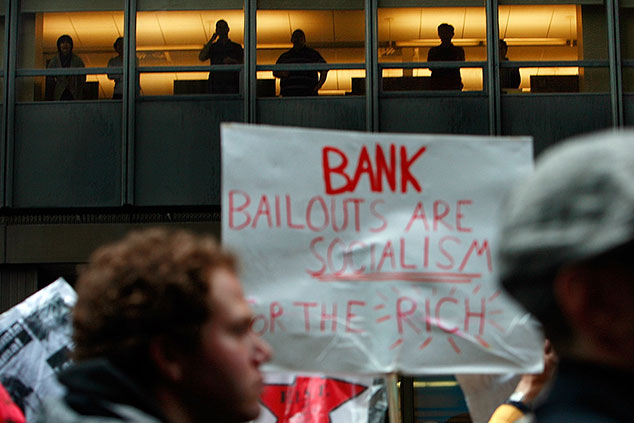
This article is taken from our FREE daily investment email Money Morning.
Every day, MoneyWeek’s executive editor John Stepek and guest contributors explain how current economic and political developments are affecting the markets and your wealth, and give you pointers on how you can profit.
In this week’s issue of MoneyWeek magazine
●
The fast-growing sport investors have never heard of
●
Resist the temptation to transfer your pension
●
Why IPOs are best avoided
●
Venture-capital trusts – buy at your peril
●
Three Korean stocks that know the value of payouts
● Share tips of the week
Not a subscriber? Sign up here
Ten years ago, any illusion that we operated within a framework of free market capitalism was completely shattered (or at least, it should have been, even though people still throw around the words as though they mean something).
The collapse of Lehman Brothers triggered a bailout bonanza, proving that certain companies were simply not allowed to go bust.
People argue over whether Lehman should have been saved or not. It’s the wrong question entirely. If ever a bank deserved to go bust, it was Lehman.
But Lehman was merely a particularly repellent symptom of a diseased system.
The real problem is that we ended up in a situation where we, the taxpayers, had no choice but to underwrite an entire industry, effectively at gunpoint.
And the real issue today is that this – unbelievably – is still the case.
Bernanke was right to bail out the banks – but now they need to be shrunk
Ben Bernanke, who was Federal Reserve chief during the crisis, has just published a paper in which he concludes that the government was right to focus on saving the banks after the financial crisis.
That might sound self-serving (“man who bailed out banks reckons it was right to bail out the banks” is the obvious headline).
But in a very narrow sense, it’s true. By the time we got to the Lehman Brothers bankruptcy, it was all over anyway. The system was set to topple, and the solution was always going to involve some sort of emergency taxpayer intervention. It was very much a “you wouldn’t start from here” situation.
As a youthfully idealistic semi-libertarian, I was against the bailouts at the time. I’m still against them now. But I’ll acknowledge that once you end up in that position, there’s not a lot you can do without causing even more havoc and collateral damage to people who had nothing to do with the original problem.
If you’re Iceland, you can let your banking sector collapse and you can survive (though I suspect plenty of Icelanders would debate whether it was the right move, because it really, really hurt). Essentially, you are small enough that there are sufficient pre-existing trust networks to keep your society together.
You can’t apply the same thing to the entire globe, because if a guy in China can’t be sure that a guy in the US is going to pay him for shipping a cargo of plastic around the world, then it’s not going to happen. And there is no point on paralysing our entire system of exchange and financial interaction because a bunch of self-serving chancers have run it into the ground.
Quick illustration: infuriatingly, I can’t find the original article this story came from, though I know it was on the Bloomberg terminal originally. But I specifically remember a story about a group of researchers stuck on an island north of Canada just as winter was drawing in. They were effectively going to be stranded – which would basically have meant dying – without any supplies, if confidence in trade finance was not restored. (If you find the original story, by the way, then do please feel free to tweet it to me @John_Stepek.)
So yes, by the time we got to 2008, you needed a big lender of last resort to step in and save the system. And it wouldn’t be the first time this had happened.
We’ll be back here one day – and I don’t know if we’ll have learned anything
But what is a problem is the extent to which those same self-serving chancers who brought the system down were then given an easy ride. Virtually no one went to jail (Libor-rigging and rogue trading doesn’t count, as far as I’m concerned – those were separate scandals related to specific organisational culture issues, and in both cases, Libor in particular, minnows were picked on and turned into scapegoats).
More importantly, we’ve really only paid lip service to the idea of restructuring the financial system. We’re still left with the fundamental problem that profits are privatised, while losses are still highly likely to be socialised, because the big banks are still huge enough to blow a hole in the global economy if they screw up again.
Meanwhile, you’ve got those same banks lobbying for the restrictions that have been placed on them to be rolled back or scrapped. And even if that doesn’t happen today or next week, it’ll happen at some point in the future. Because it will be politically expedient for some future administration to do so.
I don’t believe that the next big crisis – the next date for the diaries of bubble historians – will be centred on the banks. That’s just not the way these things work. But at some point in the future, we’ll be back here again.